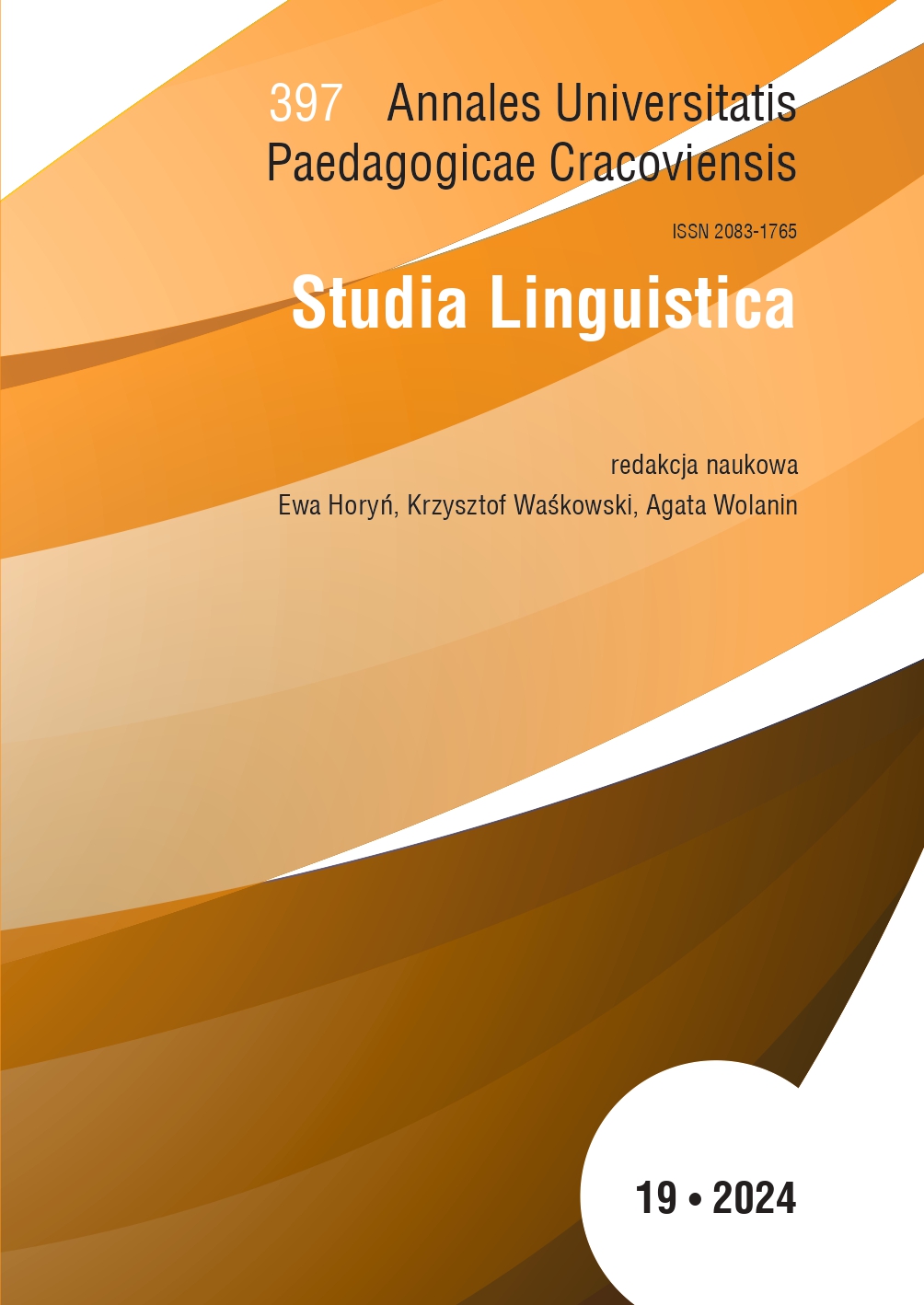The techniques of introducing English acronyms in the Polish medical texts: a corpus-based study
Main Article Content
Abstrakt
The paper outlines the research on the usage of English borrowings, specifically acronyms, in the Polish medical language. The raw data is presented alongside a discussion about the findings and their implications. The research was conducted manually, with the assistance of basic electronic tools, on a personally prepared corpus consisting of an annual run of Kurier Medyczny, a journal that covers general medical topics. The analysis included the techniques of introducing the borrowed acronyms to the readers, their general meanings, as well as data related to their frequency within the corpus.
Downloads
Article Details

Utwór dostępny jest na licencji Creative Commons Uznanie autorstwa – Użycie niekomercyjne – Bez utworów zależnych 4.0 Międzynarodowe.
Autor, zgłaszając tekst do redakcji czasopisma „Annales Universitatis Paedagogicae Cracoviensis. Studia Linguistica”, zaświadcza, iż jest on rezultatem wyłącznie jego własnej twórczości, że treść artykułu nie była dotychczas publikowana oraz że utwór nie narusza w żadnym stopniu praw autorskich ani praw pokrewnych innych osób, jak również innych praw osób trzecich, a także, że niczyje prawa do utworu (lub jego jakiejkolwiek części) nie zostały pominięte. Po podpisaniu umowy prawa majątkowe do opublikowanych materiałów zostają przeniesione na Uniwersytet Komisji Edukacji Narodowej w Krakowie.
Rocznik „Annales Universitatis Paedagogicae Cracoviensis. Studia Linguistica” to czasopismo o otwartym dostępie, a cała jego zawartość jest udostępniana bezpłatnie dla użytkowników i instytucji na zasadach licencji Creative Commons CC-BY-NC-ND 4.0 (uznanie autorstwa, użycie niekomercyjne, bez utworów zależnych). Na podstawie tej licencji autorzy zgadzają się, że ich prace mogą być zgodnie z prawem ponownie wykorzystywane do jakichkolwiek celów, za wyjątkiem celów komercyjnych, bez konieczności uzyskania uprzedniej zgody ze strony autora lub wydawcy. Każdy może prace te czytać, pobierać, kopiować, drukować, rozpowszechniać oraz przetwarzać, pod warunkiem poprawnego oznaczenia autorstwa oraz oryginalnego miejsca publikacji. Publikowanych tekstów nie można wykorzystywać do tworzenia utworów zależnych (np. do tłumaczenia ich i publikowania w innym języku bez zgody wydawcy). Jest to zgodne z definicją otwartego dostępu BOAI (Budapest Open Access Initiative) „Studia Linguistica”nie pobiera opłat za składanie artykułów ani ich przetwarzanie.
Autor, przesyłając artykuł do redakcji „Studia Linguistica”, bezwględnie zgadza się z poniższymi punktami:
-
Oświadczam, że jestem Autorem lub Współautorem nadesłanego tekstu. Przesłany tekst nie był nigdzie publikowany, jest całkowicie oryginalny i nie narusza w żadnym stopniu praw autorskich ani praw pokrewnych innych osób, jak również innych praw osób trzecich, a także, że niczyje prawa do utworu nie zostały pominięte.
-
Oświadczam, że nadesłany tekst nie został złożony do recenzji lub/i publikacji w innym czasopiśmie.
-
Przyjmuję do wiadomości, że Autor ponosi pełną odpowiedzialność za każdy przypadek plagiatu, niezależnie od tego, czy został on wykryty podczas procesu recenzji, czy po publikacji w „Studia Linguistica”.
-
Oświadczam, że ponoszę pełną odpowiedzialność finansową i prawną za wszelkie roszczenia związane z utworem.
-
Potwierdzam uznanie wszystkich źródeł danych wykorzystanych i cytowanych w badaniach.
-
Potwierdzam, że artykuł został wykonany z należytą starannością zgodnie ze standardami edytorskimi „Studia Linguistica”.
Bibliografia
Bauer L., 1998, Is there a class of neoclassical compounds, and if so is it productive?, “Linguistics” 36, no. 3.
Google Scholar
Baum S.V., 1962, The acronym, pure and impure, “American Speech” 37.
Google Scholar
Booij G.E., 2005, The grammar of words: An introduction to linguistic morphology, Oxford.
Google Scholar
Cannon G., 1989, Abbreviations and acronyms in English word‑formation, “American Speech” 64, no. 2.
Google Scholar
Crystal D., 2018, The Cambridge Encyclopedia of the English Language, Bangor.
Google Scholar
Davenport B., 1943, Initials into words, “American Notes and Queries” 2.
Google Scholar
Fleischman S., 2003, Language and medicine, [in:] The handbook of discourse analysis, edited by D. Tannen, Oxford, pp. 470–502.
Google Scholar
Grabias S., 1997, Język w zachowaniach społecznych, Lublin.
Google Scholar
Grucza F., 2002, Języki specjalistyczne – indykatory i/lub determinanty rozwoju cywilizacyjnego, [in:] Problemy technolingwistyki, edited by J. Lewandowski, Warszawa, pp. 9–26.
Google Scholar
Grucza S., 2006, Komunikacja specjalistyczna a idiokontekst specjalistyczny i konsytuacja specjalistyczna, [in:] Glottodydaktyka i jej konteksty interkulturowe, Studia Rossica XVIII, edited by A. Wołodźko‑ Butkiewicz, W. Zmarzer, Warszawa, pp. 209–223.
Google Scholar
Grucza S., 2008, Lingwistyka języków specjalistycznych. Języki. Kultury. Teksty. Wiedza, Warszawa.
Google Scholar
Górnicz M., 2003, Terminologia tekstów specjalistycznych, [in:] Lingwistyczna identyfikacja tekstów specjalistycznych, edited by B.Z. Kielar, S. Grucza, Warszawa, pp. 106–117.
Google Scholar
Haugen E., 1950, The analysis of linguistic borrowing, “Language” 26, pp. 210–231.
Google Scholar
Mosman J., 1993, Dictionary of abbreviations acronyms and initialisms, Gale.
Google Scholar
Pilegaard M., 2000, Introduction, “HERMES. Journal of Language and Communication Studies” 13 (25), pp. 7–9.
Google Scholar
Perlińska L., Krzyżowski J., 2008, Medical slang & acronyms, Warszawa.
Google Scholar
Quirk R., Greenbaum S., Leech G., Svartvik J., 1985, A comprehensive grammar of the English language, London – New York.
Google Scholar
Szulc A., 1984, Podręczny słownik językoznawstwa stosowanego, Warszawa.
Google Scholar
Warner R., 1976, The relationship between language and disease concepts, “International Journal of Psychiatry in Medicine” 7, pp. 57–68.
Google Scholar
Weinreich U., 1953, Languages in contact, The Hague.
Google Scholar
Wilkoń A., 1987, Typologia odmian językowych współczesnej polszczyzny, Katowice.
Google Scholar
Witalisz A., 2016, Przewodnik po anglicyzmach w języku polskim, Kraków.
Google Scholar
